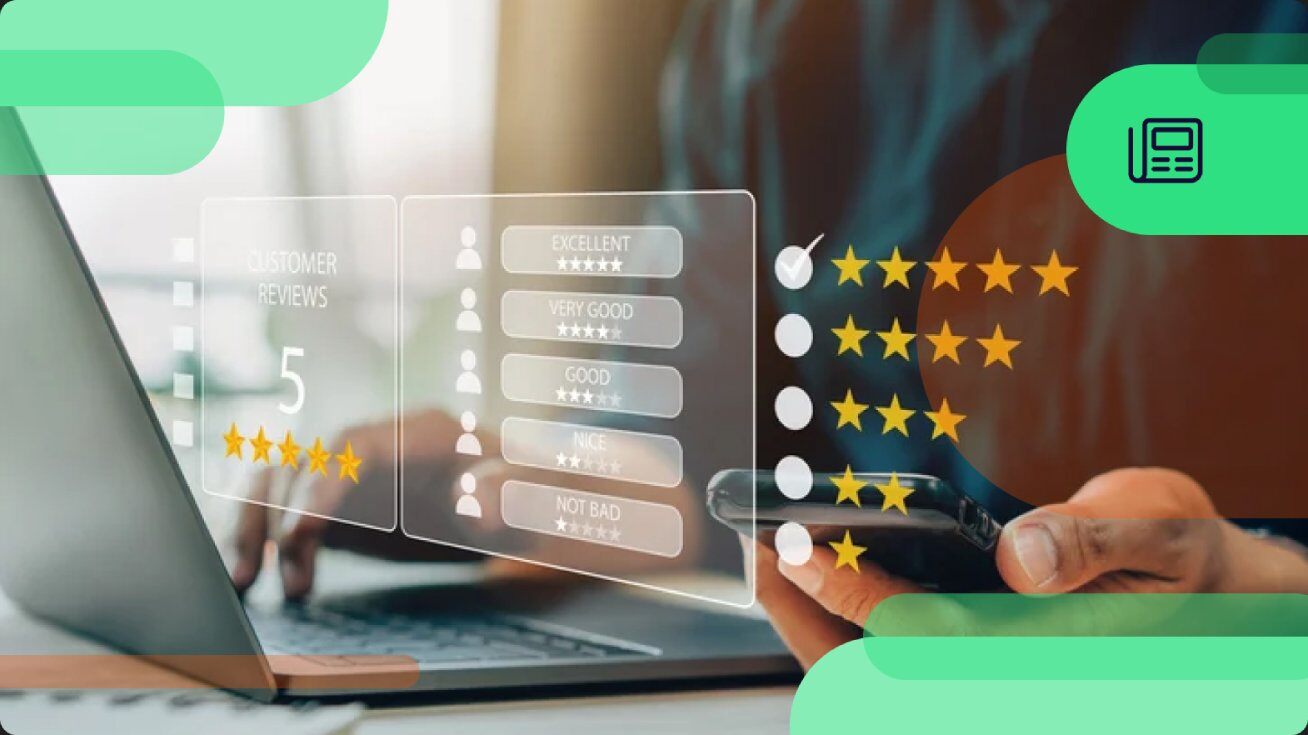29 Ways to Get Online Reviews for Your Business
How to Get Customer Reviews for Your Small Business
Online reviews are important. Over 90% of customers trust reviews as much as personal recommendations—one of many reasons for why online reviews matter.
But how do you go about collecting them to grow your business?
Getting more Google reviews or Facebook reviews isn’t easy for any business. It can feel awkward asking for one. Plus there’s the anxiety that comes with a possible negative review.
So how do you ask for Google reviews? Or Facebook reviews or online recommendations in general?
These are the best ways to start getting reviews from your customers. Let's get to it!

Learn How to Ask Customers for Online Reviews
29 Ways to Get Customer Reviews
- Act promptly
- Ask at the right time
- Make reviews visible
- Make in-store requests for reviews
- Reward customers for writing an online review
- Fish where the fish are
- Cast a wider net
- Create a process
- Facebook reviews
- Google reviews
- Yelp reviews
- Share your reviews
- Ask for reviews again with CTAs
- Employee advocacy
- Turn a negative into a positive
- Keep those negative reviews
- Make your review requests easy to use
- Follow up on review requests
- Get more reviews in other places
- Monitor and manage reviews
- Encourage customer reviews with amazing customer service
- Offline to online
- Spotlight a customer
- Ask for help
- Target your best customers
- Offer review options
- Engage before asking
- Earn your reviews
1. Start By Asking
Most consumers (over 70%) state they would provide a review if asked. But most businesses do not ask.
In fact, about 32% of businesses either don’t think it’s appropriate to ask or don’t have an easy way to get reviews. However, asking for reviews is always a good idea.
2. Act Promptly
When you request a review shortly after a sale, it’s more likely that the customer will comply.
They might require a few reminders, but it’s far more certain a customer will be willing to provide a review compared to when too much time has passed.
Ask anywhere from an hour to a day after the sale and follow up weekly a few times.
3. Ask at the Right Time
In addition to being prompt and sending those review requests soon, timing can be everything.
The ideal time to ask is between 1-3 p.m., when response rates can jump by as much as 20%.
The theory is that people are finishing lunch, checking emails and not necessarily ready to get back to work. Also, about 33% more reviews are written on a Monday than a Saturday.
4. Make Reviews Visible
Even when not asking, making reviews visible not only helps conversions when people visit your website—it’s also a reminder to past customers.
Displaying badges on your website also compels customers to leave reviews.
In the case of Yelp, you should not ask for reviews as it goes against their terms, but displaying a Yelp badge can remind customers and help them to find your page.
5. Make In-Store Requests for Reviews
If your customers come to your place of business, such as a restaurant, a retail shop or a clinic, you can put a request near your point-of-sale or checkout area.
This request will remind them that if they were happy with your product or service, you would appreciate a review.
If you’re able to acquire their email or phone number for things like coupons or newsletters, it makes it much easier to send those much needed reminders as well.
You can take it even further when it comes to offline visibility. Place signage and badges for customers to see like door stickers and print & mount reviews on the wall.
Also try printing review requests on receipts and invoices!
6. Reward Customers for Writing an Online Reviews
In our guide that answers the question can you buy Google reviews, our answer is a resounding “no”; you should not try to incentivize review requests through outright bribery.
But you can reward those who do leave a review, which can create positive sentiment and make them feel appreciated. Rewarding customers also generates additional word-of-mouth.
7. Fish Where the Fish Are
Ensure you have registered or claimed the main websites where reviews might appear. The main ones include Google My Business (GMB), Facebook and Yelp.
But there’s a small handful of others you should monitor and manage too.
Determine which ones matter by searching for what makes sense for your business. (If you run a contracting business, for instance, check out our list of contractor referral sites.)
When it comes to the big ones, you’ll want to monitor, manage and respond to reviews to reap the benefits.
Fewer than 55% of businesses have created or claimed a GMB profile page and less than 40% have done so on Yelp, providing you an opportunity to stand out from competitors.
Setting up these accounts is important because you’ll need them to get reviews—and reviews resemble testimonials as they provide examples of social proof for your business.
These websites can help convert a customer to choose your business and boost your small-business referrals.
They also build trust, especially when a customer sees a review from someone they know who’s taken the time to write one about your business.
That’s what local-marketing advocacy is all about, and a review, referral or testimonial carries a lot of influence for customers, creating micro moments that help convert.
8. Cast a Wider Net
Add review requests to most of your communications. Besides receipts and invoices, you can also add them to email signatures and business cards.
Increasing the visibility of your interest also helps with getting unsolicited reviews.
While it pays to ask, it's also good to make customers aware that you’re interested in getting reviews without having to ask.
Whether it’s a sticker on the door or a poster ear a checkout, planting this seed can be enough for a few to take action.
9. Create a Process
While getting more reviews starts by asking for them, asking only once isn’t enough. People can be busy or forgetful. To manage the process, remind customers of your review request.
One reason why a software for online reputation marketing like NiceJob works well is that its automated reminders lead to better results than manually asking for reviews.
NiceJob users receive about 75% more reviews within three months on average, helping them to generate more business and sales.
10. Facebook Reviews
Most know that Facebook’s popularity makes it a great place to get reviews.
Since user activity can appear in feeds, it provides additional exposure that’s usually very beneficial to small businesses looking for ways to reach local markets.
Be sure that your Facebook review tab is visible and activated. If it isn’t, your great reviews will be hidden from potential customers.
You may have visited one of your favorite businesses on Facebook and noticed you can’t leave a review. It’s because they haven’t activated Facebook reviews or feedback.
To activate reviews for Facebook, visit the settings of your Facebook Page, scroll down to where it says reviews and turn them on.
Check out our article for further advice on how to set up reviews on a Facebook Page.
Also be sure to respond to all feedback. By responding to all feedback, you will actually get more reviews.
Even if someone just left a rating without comments, you should always thank the customer when and where possible—and don’t use “canned responses” either.
11. Google Reviews
Without doubt the reviews on Google My Business (GMB) are powerful.
Most customers will turn to Google Search when looking for info on a local product or service and Google has the largest market share when it comes to search engines.
Within local search results are businesses with reviews appearing almost 95% of the time.
If you haven’t registered your business with Google, do so immediately so you can ask for Google reviews. For more information, learn how to optimize Google My Business.
Nearly 50% of businesses don’t have a Google profile, claimed or otherwise, and getting GMB is one of the easiest ways to get more customers for your business.
When you’ve verified your business with Google, your reviews not only appear in search results but Google Maps as well.
And as a fun bonus, GMB also qualifies companies for Local Services by Google for even more exposure.
12. Yelp Reviews
In addition to Google and Facebook, one other platform most businesses don’t want to overlook is Yelp.
As mentioned, it’s not advised to request reviews for Yelp as it goes against their terms of service. Yelp could even decrease your Yelp rating if you’re asking for Yelp reviews.
However, you can still display a Yelp badge on your website or offer a link to prompt customers to leave you a review.
These options indirectly suggest you would appreciate a review while still complying with Yelp’s terms.
And as with Google and Facebook, be sure to respond to Yelp reviews whether they're positive or negative. Don’t forget to check out our guide on responding to Yelp reviews.
13. Share Your Reviews
You work hard to provide a great product or service and provide exceptional customer service. Great reviews and referrals are part of the reward.
When you share your reviews on social media or your website, you amplify the exposure. Sharing reviews also makes it more likely that others will provide you with an online review.
Social media doesn’t work for most that only mention themselves; it isn’t primarily an advertising platform. It’s for sharing, both about your company and what will interest others.
Sharing reviews is at the heart of reputation marketing—the art of using customer reviews in your marketing campaign.
This is super important to do for both Google and Facebook reviews. (And even though it’s more difficult on Instagram, we’ve also outlined ways to share Instagram reviews too!)
By sharing reviews, you can turn customer reviews into social proof reviews. An example is repurposing a review as a “proof” for potential customers on how reputable your business is.
14. Ask for Reviews Again With CTAs
Another form of asking for reviews is placing CTAs (calls-to-action) on your website for visitors to find.
Adding something such as “Leave us a review” on your site can be extremely effective. If you have a newsletter, that’s another place for a CTA to get more customer reviews.
Remember, CTAs are an important part of building a lead-generation website, so don’t forget to ensure your website provides opportunities for visitors to take action to increase sales.
15. Employee Advocacy
Encouraging and incentivizing employees to request customer feedback and reviews can make a significant difference. Make it part of your employee training and processes.
Good employees take pride in their work. When you incentivize them to request reviews, great things can happen. You’ll get more Google reviews and motivate employees to be even better.
Some businesses reward employees when they get verifiable mentions. When a customer leaves a review, you should track which employee served them or requested the review.
There’s many ways to go about this, but NiceJob’s reputation marketing software has an Employee Leaderboard to make the process simple. Your revenue will thank you.
16. Turn a Negative Into a Positive
There’s no avoiding negative reviews. Sooner or later, it happens to all businesses. As they say, you can’t please all people all the time.
But you can use negative reviews and feedback to your advantage. Only one in 25 of all customers ever mention why they’re dissatisfied; that’s valuable info you’re missing out on.
So you should take what constructive feedback you can get to help improve your business.
You should also respond to negative reviews as it’s a chance to resolve an issue. And it’s worth the effort to retain and attract customers since others can see your responses.
There are many cases in which how a company responds to negative reviews has influenced others to choose a business.
If you’re unsure on how to react to a negative review, learn how to reply to negative feedback. Always be professional and respectful—it goes a long way!
17. Keep Those Negative Reviews
While it’s tempting to delete negative reviews, it isn’t advised. For starters, most review platforms don’t give you the option to personally delete reviews anyways.
If you want a review gone, you have to report it. But don’t be overzealous about it. Many people find it suspicious if a business doesn’t have at least some bad ones.
A business without any negative reviews seems improbable. So how a business responds to negative reviews has influence.
Being apologetic and showing signs of genuine concern in resolving issues tells potential future customers that they will be able to count on you to make things right if need be.
Of course, if you get a review that looks fishy, make sure you know how to handle it to protect your business. We have a handy guide about fake reviews on Google to help.
18. Make Your Review Requests Easy to Use
If you simply tell customers you want reviews, you’re making it harder for yourself than you need to. To get more reviews, suggest where you’d like customers to leave them for you.
For example, review requests automatically sent by customizable NiceJob campaigns give users one-click options to guide them in the right direction.
19. Follow Up on Review Requests
It is absolutely essential in most cases to ask customers more than once to provide a review. Many forget or are unable to write one at the time they received your request.
Remember, over 70% of people said they would provide an online review for a business if asked. But only about half of that over 70% of people do write reviews.
Reminders only increase the odds of getting more reviews for your business. Reputation marketing software like NiceJob makes a big difference thanks to automated followups.
20. Get More Reviews in Other Place
While review sites like Google, Facebook and Yelp have been mentioned, there are many other options out there, and probably ones that suit your type of business.
For example, if you run a hotel, then you’ll want to know how to get Tripadvisor reviews. Or if you’re a realtor, then learn about the best real estate agent review sites.
If you’re a doctor, plumber, lawyer, locksmith, housecleaner or just about any other business, then check out the top review sites that work for almost any industry!
21. Monitor and Manage Reviews
You can’t manage things if you’re not monitoring. Without keeping an eye out for reviews to reply to, whether positive or negative, how can you maintain a strong overall rating?
An effective review management strategy involves monitoring, managing and requesting reviews to improve your visibility, increase reviews, improve sales and grow your business.
22. Encourage Customer Reviews With Amazing Customer Service
In order to encourage customers to write reviews for your business, it starts with a great product or service and amazing customer service.
According to one study, over 80% of businesses thought they provide exceptional customer service but only about 8% of customers agreed.
Good isn’t good enough. If you want to earn great reviews from customers, you need to be the best at what you do and always go the extra mile.
Always ask yourself, What can I do to get an 11-star review instead of a five-star review? To help, make sure you know the ins and outs of delivering exceptional customer service.
Additionally, keep in mind that most negative experiences with a business are related to customer service, something completely within your control to manage and improve upon.
23. Offline to Online
There are times where customers might verbally communicate gratitude or praise. This is an opportunity to be proactive in getting more reviews.
Explain that their feedback means a lot and you would appreciate them sharing it with others via an online review.
Go about it in the moment because the customer is already in a positive mindstate and you’re asking them directly, so they’ll likely comply with a request and write a review for you.
The challenge lies in connecting. Whether giving them a printed card or communicating via email or text, just asking is not as effective as continued communication.
It is invaluable for a business to build a list of customers with contact details, especially from offline touchpoints.
24. Spotlight a Customer
When you receive customer reviews, finding a way to feature the customer is a great way to show your appreciation for their feedback.
From sharing the review on social media or including it on your website to sending a personal gift or creating a case study, you’ll be pleasantly surprised at the long-term ROI.
25. Ask for Help
By contacting customers and asking for their help, it’s a different approach that can resonate with your customers simply by changing how you went about requesting a review.
Sometimes it’s all about how you say it. This can be used as a way to appeal to a customer through reminders.
26. Target Your Best Customers
When you focus on requesting reviews from your best customers, they’re likely more inclined to provide you with a positive review.
For the ones you recognize and see often, you could place a printed request in their shopping bag or staple to their receipt.
With a review software like NiceJob, customer labels for important or happy in other softwares can easily trigger unique actions in review-solicitation campaigns via integrations!
27. Offer Review Options
It’s great if you’ve registered your business on Google, Yelp or Facebook, but when you only have one platform or review site to collect reviews, it decreases your chances.
While you won’t need to be on every possible review website that you can find, you should monitor and manage the ones that are the most important to your business.
28. Engage Before Asking
Another way to get customer reviews is to engage the customer on something else, such as whether they were happy with your customer service or their latest purchase.
With this approach, don’t go for an upsell—just demonstrate an interest in the customer. Should they reply, this is when you can mention your appreciation for an online review.
29. Earn Your Reviews
It’s going to sound simple, possibly silly, but it works. Aim to be the best at what you do and great reviews often follow.
But keep in mind that relying on things to grow organically is a slow way of ever making that happen. It’s best to manage the process, request reviews and follow up.
It starts with creating a great customer experience and then asking for reviews.
If you want to encourage customers to write reviews, you need to make it easy for them. Being listed on major review sites and publicizing those listings to customers always helps.
Many of the tips above will provide more customer reviews, but the essentials for success are great customer service, asking for reviews and reminding customers with followups.
Final Thoughts on How to Get Customer Reviews
When it comes to online reviews, customers don’t just look at the star rating. They also look at the overall number of reviews and how recent they might be.
Many businesses make the mistake of getting a handful of reviews and move on.
To get the most from your online reviews, ensure that you get customer reviews in a steady stream so they’re fresh. Over 70% of people see reviews older than 90 days as irrelevant.
Within your email signature, you should always display links to your Google My Business, Facebook and Yelp pages to make it easy for customers.
It’s worth mentioning that businesses that make the effort to collect emails from their customers for newsletters, rewards programs or other purposes have an advantage.
This advantage will always benefit getting more customer reviews. A direct channel of communication is something every business should aspire to build.
With all these tips, all you need to do is figure out is where to start.
It’s a process, one that requires management and automation.
This is why NiceJob was created. To get more and better online reviews.




